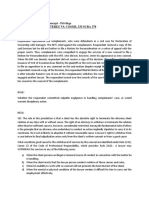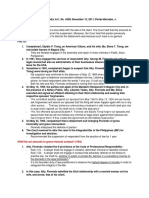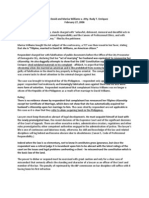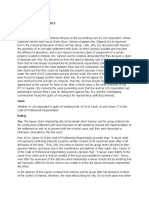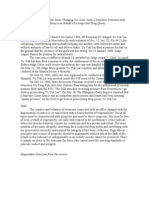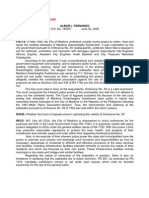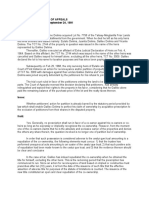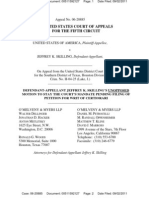Research and Services Realty
Research and Services Realty
Uploaded by
iris_irisCopyright:
Available Formats
Research and Services Realty
Research and Services Realty
Uploaded by
iris_irisCopyright
Available Formats
Share this document
Did you find this document useful?
Is this content inappropriate?
Copyright:
Available Formats
Research and Services Realty
Research and Services Realty
Uploaded by
iris_irisCopyright:
Available Formats
RESEARCH and SERVICES REALTY, INC., petitioner, vs. COURT OF APPEALS and MANUEL S. FONACIER, JR., respondents.
FACTS: On 3 November 1969, the petitioner RESEARCH and SERVICES REALTY, INC. entered into a Joint Venture Agreement with Jose, Fidel, and Antonia Carreon. On 4 April 1983, the Carreons and a certain Patricio C. Sarile instituted before the RTC of Makati City an action against the petitioner for rescission of the Joint Venture Agreement. On 9 April 1985, the petitioner engaged the services of private respondent Atty. Manuel S. Fonacier, Jr., [4] who then entered his appearance in Civil Case No. 612. While the said case was pending, the petitioner, without the knowledge of the private respondent, entered into a Memorandum of Agreement (MOA)[5] with another land developer, Filstream International, Inc. On 31 March 1993, the petitioner terminated the legal services of the private respondent. At the time the petitioner had already received P7 million from Filstream. Upon knowing the existence of the MOA, the private respondent filed in Civil Case No. 612 an Urgent Motion to Direct Payment of Attorney's Fees and/or Register Attorney's Charging Lien praying, among other things, that the petitioner be ordered to pay him the sum of P700,000.00 as his contingent fee in the case.[6] Petitioner contends that private respondent did not exert any effort to amicably settle the case, nor was he even present during the negotiations for the settlement of the same. There was, therefore, no legal and factual justification for the private respondent's "fantastic and unreasonable claim for attorney's fees of P600,000.00." On the other hand, the private respondent asserted that he was assured by the petitioner that non-collection cases were included in the contingent fee arrangement specified in the retainer contract wherein there was to be contingent compensation for any award arising from any lawsuit handled by him. According to him, Civil Case No. 612 was not the only "non-collection" case he handled for the petitioner. ISSUE Whether respondent is entitled to attorneys fees for the MOA HELD: YES. An analysis of the contract clearly shows that it was a general retainer, since its primary purpose was to secure beforehand the services of the private respondent for any legal problem which might afterward arise. [19] The fixed retaining fee was P800.00 a month. A retaining fee is a preliminary fee paid to ensure and secure a lawyer's future services, to remunerate him for being deprived, by being retained by one party, of the opportunity of rendering services to the other party and of receiving pay from him. In the absence of an agreement to the contrary, the retaining fee is neither made nor received in consideration of the services contemplated; it is apart from what the client has agreed to pay for the services which he has retained him to perform. [20] In the retainer contract in question, there was no intention to make the retaining fee as the attorney's fees for the services contemplated. This is evident from the provision allowing additional attorney's fees in collection cases consisting of (1) a "contingent fee" and (2) whatever the petitioner might recover as attorney's fees in each case. The latter could only refer to the attorney's fees which the court might award to the petitioner in appropriate cases. While the contract did not mention non-collection cases, it is, nevertheless, clear therefrom that such cases were not excluded from the retainership, as borne out by the provision requiring the private respondent to "make appearances in Court for cases involving the corporation or any allied cases pertaining to the latter." As to such cases, there was no specific stipulation of additional attorney's fees. Nevertheless, nothing therein shows that the private respondent agreed to render professional service in such cases gratuitously. The absence then of the stipulation of additional attorney's fees cannot be construed as a bar to the collection of additional attorney's fees in non-collection cases. Accordingly, as to non-collection cases where the petitioner was either a plaintiff or a defendant, the private respondent could still collect attorney's fees, apart from his regular retaining fee, on the basis of anysupplemental agreement or, in its absence, under the principle of quantum meruit. There was no such supplemental agreement in this case. We cannot sustain the private respondent's theory that he could collect attorney's fees on contingent basis because in the other "non-collection" cases he handled for the petitioner' he was paid on contingent basis at the rate
of 10% of what was awarded to the petitioner. In the first place, Civil Case No. 612 is still unresolved, and no judgment has yet been rendered in favor of the petitioner. The amount in the memorandum of agreement could not be made the basis of a "contingent fee" in the said case for at least three reasons. First, in his own Urgent Motion to Direct Payment of Attorney's Fees and/or Register Attorney's Charging Lien, the private respondent based the contingent fee not only in Civil Case No. 612 but in a "multitude of peripheral cases," and the contingent fee would become due and collectible only if and when the petitioner obtains a judgment in his favor in Civil Case No. 612. Second, the amount of P28 million, which Filstream agreed to pay the petitioner, was not a judgment or award in favor of the petitioner in Civil Case No. 612. It was the consideration of the assignment, transfer, and conveyance to Filstream of all the petitioner's "rights, interest and participation embodied and specified in the Joint Venture Agreement (Annex "A") and in all the eight hundred seventy-five (875) parcels of land comprising the SARANAY HOMES subdivision. . . ." Third, as correctly posited by the petitioner, the private respondent had no participation in the negotiations leading to, and in the preparation of, the memorandum of agreement. Indisputably then, the private respondent's attorney's fee on "contingent basis" in Civil Case No. 612 is unwarranted. If at all, he could only be entitled to attorney's fees on quantum meruit basis as of the expiration of his retainer contract on 31 March 1993. Quantum meruit simply means "as much as he deserves." [24] In no case, however, must a lawyer be allowed to recover more than what is reasonable pursuant to Section 24, Rule 138 of the Rules of Court, which provides: SEC. 24. Compensation of attorneys, agreement as to fees. An attorney shall be entitled to have and recover from his client no more than a reasonable compensation for his services, with a view to the importance of the subject-matter of the controversy, the extent of the services rendered, and the professional standing of the attorney. No court shall be bound by the opinion of attorneys as expert witnesses as to the proper compensation, but may disregard such testimony and base its conclusion on its own professional knowledge. A written contract for services shall control the amount to be paid therefor unless found by the court to be unconscionable or unreasonable. This Court had earlier declared the following as circumstances to be considered in determining the reasonableness of a claim for attorney's fees: (1) the amount and character of the service rendered; (2) labor, time, and trouble involved; (3) the nature and importance of the litigation or business in which the services were rendered; (4) the responsibility imposed; (5) the amount of money or the value of the property affected by the controversy or involved in the employment; (6) the skill and experience called for in the performance of the services; (7) the professional character and social standing of the attorney; (8) the results secured; and (9) whether the fee is absolute or contingent, it being recognized that an attorney may properly charge a much larger fee when it is contingent than when it is not. [25] It was incumbent upon the private respondent to prove the reasonable amount of attorney's fees, taking into account the foregoing factors or circumstances. The records before us and the trial court's 11 October 1993 order do not confirm that the private respondent proved by either testimonial or documentary evidence that the award of P600,000.00 was reasonable. It necessarily follows then that the 11 October 1993 order has insufficient factual basis, and the trial court committed grave abuse of discretion in arbitrarily fixing the private respondent's attorney's fees at P600,000.00. MINI Digest FACTS: Petitioner RESEARCH and SERVICES REALTY, INC. entered into a joint venture agreement with Jose, Fidel and Antonia Carreon. Subsequently, the Carreons filed an action to rescind the Joint Venture agreement entered. Petitioner then acquired the services of Private respondent Atty Manuel Fonacier. Without the conformity and knowledge of Fonacier petitioner entered into a Memorandum of agreement with Filstream. The services of Atty Fonacier was then terminated. Upon learning of this act Fonacier filed an Urgent Motion to Direct Payment of Attorney's Fees and/or Register Attorney's Charging Lien praying, among other things, that the petitioner be ordered to pay him the sum of P700,000.00 as his contingent fee in the case ISSUE: Whether Atty Fonacier is entitled to attorneys fees. HELD: YES. Two basic principles come into play. The first is as stated earlier, viz., that the retaining fee is neither made nor received in consideration of the services contemplated unless the contract itself so provides. The second is that, unless expressly stipulated, rendition of professional services by a lawyer is for a fee or compensation and is not gratuitous. This is implicit from the opening clause of Section 24, Rule 138 of the Rules of Court, which states that "[a]n attorney shall be entitled to have and recover from his client no more than a reasonable compensation for his services . . .," and by virtue of the innominate contract of facio ut des (I do and you give). Accordingly, as to non-
collection cases where the petitioner was either a plaintiff or a defendant, the private respondent could still collect attorney's fees, apart from his regular retaining fee, on the basis of any-supplemental agreement or, in its absence, under the principle of quantum meruit. There was no such supplemental agreement in this case. Quantum meruit simply means "as much as he deserves." [24] In no case, however, must a lawyer be allowed to recover more than what is reasonable pursuant to Section 24, Rule 138 of the Rules of Court. This Court had earlier declared the following as circumstances to be considered in determining the reasonableness of a claim for attorney's fees: (1) the amount and character of the service rendered; (2) labor, time, and trouble involved; (3) the nature and importance of the litigation or business in which the services were rendered; (4) the responsibility imposed; (5) the amount of money or the value of the property affected by the controversy or involved in the employment; (6) the skill and experience called for in the performance of the services; (7) the professional character and social standing of the attorney; (8) the results secured; and (9) whether the fee is absolute or contingent, it being recognized that an attorney may properly charge a much larger fee when it is contingent than when it is not. [25]
You might also like
- Zaldivar v. Sandiganbayan (Digest: Legal Ethics)Document2 pagesZaldivar v. Sandiganbayan (Digest: Legal Ethics)Dany Abuel100% (1)
- Ruel Tuano y Hernandez vs. People of The Philippines 2016Document1 pageRuel Tuano y Hernandez vs. People of The Philippines 2016Hadjie LimNo ratings yet
- Case No. 4 Venterez vs. Cosme, 535 Scra 378 - DigestDocument2 pagesCase No. 4 Venterez vs. Cosme, 535 Scra 378 - DigestKate Garo100% (1)
- In Re Amparo DigestDocument1 pageIn Re Amparo DigestM. CoCoNo ratings yet
- Masmud Vs NLRC and Atty Go DigestDocument2 pagesMasmud Vs NLRC and Atty Go DigestMichael Parreño Villagracia100% (1)
- Santos JR Vs Atty. Llamas Digest2Document1 pageSantos JR Vs Atty. Llamas Digest2Christopher AdvinculaNo ratings yet
- Barcernas Vs AlveroDocument1 pageBarcernas Vs AlveroAngela SuttonNo ratings yet
- Villahermosa Vs Caracol DigestDocument2 pagesVillahermosa Vs Caracol DigestKlarence Orjalo100% (3)
- Consorcia Rollon vs. Atty. Camilo NaravalDocument1 pageConsorcia Rollon vs. Atty. Camilo Naravalscartoneros_1100% (1)
- HIlado Vs David DigestsDocument4 pagesHIlado Vs David DigestsEve Cedullo100% (1)
- Legal Ethics Case Digest: Page 1 of 3Document3 pagesLegal Ethics Case Digest: Page 1 of 3jci028No ratings yet
- Ac 9604 Tapay VS BancoloDocument2 pagesAc 9604 Tapay VS BancoloRoxanne Datuin Uson100% (2)
- Request For CertificationDocument1 pageRequest For Certificationiris_iris50% (4)
- Sample NTEDocument1 pageSample NTEiris_iris100% (1)
- 1 - Gacias vs. BulauitanDocument1 page1 - Gacias vs. BulauitanTawana HolmesNo ratings yet
- 54) Rilloraza v. Eastern TelecomsDocument2 pages54) Rilloraza v. Eastern TelecomsprincessF0717100% (1)
- Navarro Vs Meneses III, A.C No. 313 (Legal Ethics)Document3 pagesNavarro Vs Meneses III, A.C No. 313 (Legal Ethics)Marlouis U. Planas100% (1)
- SABERON Vs LarongDocument2 pagesSABERON Vs LarongCeresjudicata100% (1)
- Case X-A (Angeles vs. Uy)Document2 pagesCase X-A (Angeles vs. Uy)Lilibeth Dee GabuteroNo ratings yet
- Gacias vs. Atty. BulauitanDocument3 pagesGacias vs. Atty. BulauitanChristopher G. HalninNo ratings yet
- Lee V SimandoDocument3 pagesLee V SimandoMaureen Co100% (1)
- 4ethics Bansig V CeleraDocument3 pages4ethics Bansig V CeleraAmor Basatan ManuelNo ratings yet
- D. Natanauan v. Atty. TolentinoDocument3 pagesD. Natanauan v. Atty. TolentinoKORINA NGALOYNo ratings yet
- Perez V. de La Torre (Claudio)Document1 pagePerez V. de La Torre (Claudio)AbbyElbamboNo ratings yet
- Barnachea Vs Quicho Rule 16.04Document2 pagesBarnachea Vs Quicho Rule 16.04Zebulun DocallasNo ratings yet
- Laput Vs RemotigueDocument2 pagesLaput Vs RemotigueLu CasNo ratings yet
- Ylaya v. Atty. GacottDocument2 pagesYlaya v. Atty. GacottRaineNo ratings yet
- Rivera-Pascual V LimDocument3 pagesRivera-Pascual V LimRose De JesusNo ratings yet
- Case Digest G.R. No. L-41862Document3 pagesCase Digest G.R. No. L-41862Yie SualmNo ratings yet
- Tiong Vs Florendo (2011)Document2 pagesTiong Vs Florendo (2011)AbbyElbamboNo ratings yet
- Genato Vs Atty. Sipalan A.C. No. 4078 (2003)Document2 pagesGenato Vs Atty. Sipalan A.C. No. 4078 (2003)Katharina Canta100% (1)
- Genato v. SilapanDocument2 pagesGenato v. SilapanMara ClaraNo ratings yet
- Williams v. EnriquezDocument2 pagesWilliams v. EnriquezDominique Larin100% (1)
- A.C. No. 6664 Samson V EraDocument2 pagesA.C. No. 6664 Samson V EraKristen WhiteNo ratings yet
- Foodsphere VS MauricioDocument1 pageFoodsphere VS MauricioMarkus Tran Moralde100% (1)
- Bengco v. BernardoDocument4 pagesBengco v. BernardoAlthea Angela Garcia100% (1)
- Toledo v. AbalosDocument1 pageToledo v. AbalosFrancis Xavier SinonNo ratings yet
- Edilberto M. Cuenca Vs Court of Appeals: Canon 6 - These Canons Shall Apply To Lawyers in Government Service in TheDocument9 pagesEdilberto M. Cuenca Vs Court of Appeals: Canon 6 - These Canons Shall Apply To Lawyers in Government Service in TheRomz NuneNo ratings yet
- PSCFC Financial Corporation vs. Court of AppealsDocument2 pagesPSCFC Financial Corporation vs. Court of AppealsAngelica AbalosNo ratings yet
- Lorenzana Food Corporation V DariaDocument2 pagesLorenzana Food Corporation V DariaCarey AntipuestoNo ratings yet
- 3.B.d. in - Re - KapunanDocument9 pages3.B.d. in - Re - KapunanervingabralagbonNo ratings yet
- Nuique vs. SedilloDocument2 pagesNuique vs. SedilloJanine IsmaelNo ratings yet
- 02 Cruz Vs CabreraDocument1 page02 Cruz Vs CabreraPaolo Miguel ArqueroNo ratings yet
- Samson Vs EraDocument2 pagesSamson Vs EraWella Jane100% (3)
- Noble Vs Atty. AilesDocument2 pagesNoble Vs Atty. Ailesaudreydql5100% (1)
- Alcantara vs. Pefianco Case DigestDocument2 pagesAlcantara vs. Pefianco Case DigestAlexis Jay F. BarriosNo ratings yet
- Legal Ethics Case DigestDocument2 pagesLegal Ethics Case DigestCee Silo AbanNo ratings yet
- Bartolome Vs BasilioDocument2 pagesBartolome Vs BasilioMarkus Tran Moralde100% (1)
- CHRISTOPHER R. SANTOS, Complainant, vs. ATTY. JOSEPH A. ARROJADODocument4 pagesCHRISTOPHER R. SANTOS, Complainant, vs. ATTY. JOSEPH A. ARROJADOAldous SisonNo ratings yet
- JUTTA KRURSEL V ATTY. LORENZA A. ABION Case DigestDocument3 pagesJUTTA KRURSEL V ATTY. LORENZA A. ABION Case DigestEscanorNo ratings yet
- Quiambao v. Bamba (2005)Document2 pagesQuiambao v. Bamba (2005)JD DX100% (1)
- 7 Grande-vs.-De-Silva-DigestDocument3 pages7 Grande-vs.-De-Silva-DigestZyrene Cabaldo0% (1)
- Dalisay Vs Mauricio Jr.Document2 pagesDalisay Vs Mauricio Jr.AnneNo ratings yet
- Deveza V de PradoDocument2 pagesDeveza V de PradoMariz EnocNo ratings yet
- Macarubbo V MacarubboDocument2 pagesMacarubbo V MacarubboJay100% (1)
- Fil-Garcia Inc. v. Hernandez, AC 7129, 2008Document8 pagesFil-Garcia Inc. v. Hernandez, AC 7129, 2008Jerald Oliver MacabayaNo ratings yet
- In Re Atty BrionesDocument1 pageIn Re Atty Brioneshigh protectorNo ratings yet
- Reyes V Vitan and Hernandez V GoDocument4 pagesReyes V Vitan and Hernandez V GoRosana Villordon SoliteNo ratings yet
- Lijuaco V Atty. Terrado, AC No. 6317, Aug.31, 2006'Document2 pagesLijuaco V Atty. Terrado, AC No. 6317, Aug.31, 2006'Charmaine Reyes FabellaNo ratings yet
- @research and Services Realty, Inc. v. CA, G.R. No. 124074, Jan. 27,1997Document14 pages@research and Services Realty, Inc. v. CA, G.R. No. 124074, Jan. 27,1997James OcampoNo ratings yet
- Research and Services Realty Vs CADocument13 pagesResearch and Services Realty Vs CATESDA MIMAROPANo ratings yet
- LEGALETHICS-Canon 20 & Notarial LawDocument2 pagesLEGALETHICS-Canon 20 & Notarial LawCzarina Lea D. MoradoNo ratings yet
- Easement of Right of WayDocument2 pagesEasement of Right of Wayiris_iris100% (1)
- List of Requirements BIR - Transfer of Shares of StockDocument1 pageList of Requirements BIR - Transfer of Shares of Stockiris_iris0% (1)
- Sample NTE With Preventive SuspensionDocument1 pageSample NTE With Preventive Suspensioniris_irisNo ratings yet
- Sample Notice To Report To WorkDocument1 pageSample Notice To Report To Workiris_iris50% (4)
- Sample NODDocument2 pagesSample NODiris_iris50% (2)
- Justice DemetrioDocument1 pageJustice Demetrioiris_irisNo ratings yet
- List AOIDocument1 pageList AOIiris_irisNo ratings yet
- Nirc Code 1997Document254 pagesNirc Code 1997iris_irisNo ratings yet
- The Revenue District Officer: "Rule V Fees of Notary PublicDocument1 pageThe Revenue District Officer: "Rule V Fees of Notary Publiciris_irisNo ratings yet
- Deed of Absolute SaleDocument2 pagesDeed of Absolute Saleiris_irisNo ratings yet
- TEFASCO v. PPADocument2 pagesTEFASCO v. PPAiris_iris50% (2)
- Albanov. FernandoDocument1 pageAlbanov. Fernandoiris_irisNo ratings yet
- DELIMA VDocument2 pagesDELIMA Viris_irisNo ratings yet
- TERCERIADocument14 pagesTERCERIAiris_irisNo ratings yet
- January 1, 20 - : Acknowledgement ReceiptDocument1 pageJanuary 1, 20 - : Acknowledgement Receiptiris_irisNo ratings yet
- ABEJARON V.nabasaDocument2 pagesABEJARON V.nabasairis_irisNo ratings yet
- Lopez vs. Orosa CASE DIGESTDocument2 pagesLopez vs. Orosa CASE DIGESTiris_irisNo ratings yet
- Nalco Company v. Wetend Technologies OyDocument6 pagesNalco Company v. Wetend Technologies OyPriorSmartNo ratings yet
- Or He/She Should Be On Leave of Absence With Pay On The Day Immediately Preceding The Regular HolidayDocument3 pagesOr He/She Should Be On Leave of Absence With Pay On The Day Immediately Preceding The Regular HolidayDANIELA VASALLONo ratings yet
- HNLU IMUNC Brochure PDFDocument24 pagesHNLU IMUNC Brochure PDFSHASHANK SHEAKHARNo ratings yet
- EO House ClusterDocument2 pagesEO House ClusterAnne Kimberly Peñalba BabaanNo ratings yet
- MOA NLRC and NCMBDocument2 pagesMOA NLRC and NCMBjoseph iii goNo ratings yet
- Security Studies ReaderDocument701 pagesSecurity Studies ReaderSoniaDordeaNo ratings yet
- Moot Memorial PDFDocument20 pagesMoot Memorial PDFkhyathi pothulaNo ratings yet
- Microsoft Azure Administrator: @androdaggerDocument679 pagesMicrosoft Azure Administrator: @androdaggersai bNo ratings yet
- Camansihan DecDocument56 pagesCamansihan DecAngelika CalingasanNo ratings yet
- Niharika Singh - IprDocument17 pagesNiharika Singh - IprSanjeet Kumar SinghNo ratings yet
- 204 (R) Flynn Opposition To Notice of Motion To File Amicus Brief 5-12-2020Document11 pages204 (R) Flynn Opposition To Notice of Motion To File Amicus Brief 5-12-2020Fox News100% (2)
- Laurel V Misa Art - 114 TreasonDocument1 pageLaurel V Misa Art - 114 TreasonBug RancherNo ratings yet
- Affidavit of Adverse ClaimDocument2 pagesAffidavit of Adverse Claimcat_hermosoNo ratings yet
- Group 10 - The 1973 Constitution Written Report (RPH)Document13 pagesGroup 10 - The 1973 Constitution Written Report (RPH)Alexa Mae Villasis MajeranoNo ratings yet
- United Coconut Planters Banks VsDocument4 pagesUnited Coconut Planters Banks VsVance CeballosNo ratings yet
- Jeff Skilling's Motion To Stay Fifth Circuit Mandate Pending Appeal To U.S. Supreme CourtDocument12 pagesJeff Skilling's Motion To Stay Fifth Circuit Mandate Pending Appeal To U.S. Supreme CourtTom KirkendallNo ratings yet
- Republic Act No. 9266Document11 pagesRepublic Act No. 9266Rey NldoNo ratings yet
- What Are The Functions of SURCON?Document2 pagesWhat Are The Functions of SURCON?TaofiqNo ratings yet
- Environmental Sentences CJEIDocument83 pagesEnvironmental Sentences CJEIgarbagepatchNo ratings yet
- Top Up Facility ExplainedddDocument4 pagesTop Up Facility ExplainedddjenyNo ratings yet
- Deed of Absolute Sale TemplateDocument3 pagesDeed of Absolute Sale TemplateRem SerranoNo ratings yet
- Guevarra V EalaDocument2 pagesGuevarra V EalaIhna Alyssa Marie SantosNo ratings yet
- Full download Exploring Criminal Justice in Canada 2nd Edition Rick Ruddell pdf docxDocument67 pagesFull download Exploring Criminal Justice in Canada 2nd Edition Rick Ruddell pdf docxlehdeebreomu100% (2)
- Kindle Quick Start Guide v1Document6 pagesKindle Quick Start Guide v1Raymond SoNo ratings yet
- Irr LGCDocument194 pagesIrr LGCRamon T. Conducto II75% (4)
- Succession Notes Final Draft v.1Document117 pagesSuccession Notes Final Draft v.1Anonymous 2UPF2xNo ratings yet
- TMC Employee Handbook - FinalDocument34 pagesTMC Employee Handbook - FinalJoselin BerumenNo ratings yet
- Ra9262 Anti-Vawc LawDocument31 pagesRa9262 Anti-Vawc LawElaineFaloFallarcunaNo ratings yet
- Antipolo Realty Corporation vs. National Housing Authority, 153 SCRA 399 Case Digest (Administrative Law)Document2 pagesAntipolo Realty Corporation vs. National Housing Authority, 153 SCRA 399 Case Digest (Administrative Law)AizaFerrerEbina100% (2)
- Duties of A Lawyer Lecture Notes 3 PDFDocument12 pagesDuties of A Lawyer Lecture Notes 3 PDFSaidatulnajwaNo ratings yet


